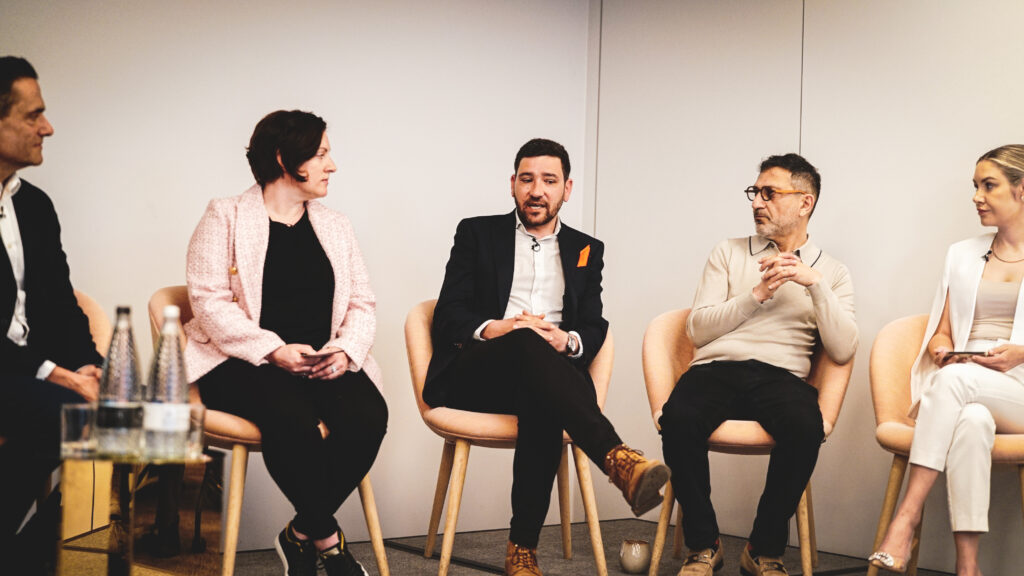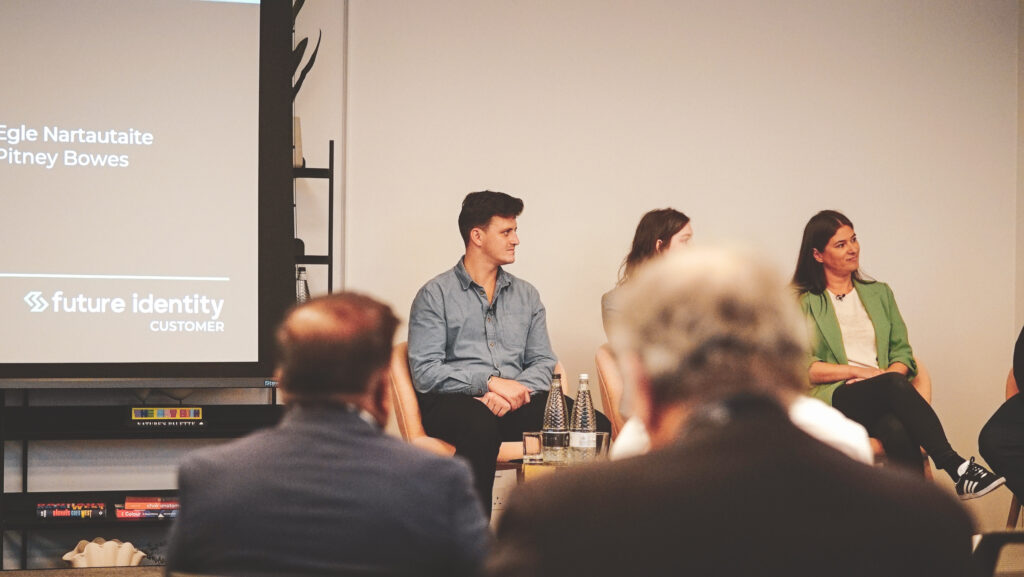Since the start of 2023 I’ve heard many times that this year will be the ‘tipping point’ for digital identity. This statement is at risk of being overused. And yet, after a day spent at Future Identity Customer, I’m convinced that it might not be far from the truth.
Throughout the day, we heard from industry changemakers working on an array of projects and initiatives powering the growth of digital identity and I left feeling positive that we will see significant progress in the very near future.
As Harry Weber Brown, Chief Engagement Officer at Zilo said, at a certain point digital identity will be, “woven into the fabric of our lives,” and we will use it without even thinking about it.
There were so many thought-provoking points made throughout the day that it would be impossible to mention everything discussed. But here are four key lessons that stood out:
-
Digital identity can greatly benefit the customer experience
Throughout the day, we heard how various industries are leveraging digital identity to provide a better experience for their customers. From enabling retailers to provide customers with a more personalised product offering, to streamlining the authentication process for accessing financial services, the benefits were heard loud and clear.
During the first session of the day, ‘Identity at the Heart of the Customer Experience’, Laura Moore, Sky’s Global Director of Identity, spoke about how identity capabilities can support a connected journey for users across multiple channels. Abol Froushan, a Senior Enterprise Architect at No7 Beauty Company echoed this, explaining that enabling users to build a reusable identity profile will streamline the customer journey and minimise the hassle of answering the same questions repeatedly at different stages.
 It was also interesting to hear the positive outcomes from the digital right to work and rent rollout, from our panel featuring speakers from Better Hiring Institute, Sheridans, Konfir and Propertymark. The panelists spoke about the time and cost savings that digital identity has unlocked, and Timothy Douglas, Head of Policy and Campaigns at Propertymark highlighted the reduction in fraud seen within the property sector and the appetite to extend the use of digital identity across the home buying and selling process.
It was also interesting to hear the positive outcomes from the digital right to work and rent rollout, from our panel featuring speakers from Better Hiring Institute, Sheridans, Konfir and Propertymark. The panelists spoke about the time and cost savings that digital identity has unlocked, and Timothy Douglas, Head of Policy and Campaigns at Propertymark highlighted the reduction in fraud seen within the property sector and the appetite to extend the use of digital identity across the home buying and selling process.
As Philip Bonhard from Lloyds Banking Group summarised on a panel discussion exploring the use of biometrics, identity is a barrier to the services that users want to access. The friction however can be minimised with the right technology. Passwords and usernames are far more inconvenient for customers than the use of biometrics, for example. By capitalising on digital identity, businesses can build a superior experience for customers across all channels.
-
Friction is a matter of perception
We spoke a lot about evolving customer expectations and the need to deliver frictionless digital services. But something that also came up many times throughout the day, was the fact that some friction is necessary and even welcomed by customers.
During the panel discussion, ‘Trust is a two-way street’, Stacey Wilkinson, Customer Attribute Sharing Product Owner at NatWest highlighted the importance of making sure customers feel that a process is secure. This can even mean, Stacey explained, including delays or visual elements to indicate that a background check is happening.
An audience member shared their disagreement with Stacey’s statement, arguing that any extra or seemingly unnecessary friction will put them off from completing an online journey. The panel agreed that this can be the case but concluded that an audience made up of people working in technology won’t make for a representative case study. User research has demonstrated that steps to explain to customers that you are protecting them are crucial to wider adoption.
Elinor Hull, Identity Services Director, at Post Office also referred to this in a subsequent panel discussion exploring identity and authentication in the retail sector. Elinor explained that people view identity as a much more personal process than something like payments so are often uncomfortable with a complete absence of friction.
The panel, also featuring speakers from Wayfair, Marks & Spencer, Payment Systems Regulator and Walgreens Boots Alliance, agreed that people want to rely on a process they can trust. For some customers, this is not an instant digital-only experience, and while we are still on a journey towards adoption it is crucial to provide choice and take steps to include guidance where needed.
-
Accessibility is a never-ending commitment
The discussion of accessibility was unavoidable, and not only during the dedicated session on this topic but throughout the day. The importance of designing for accessibility from the very beginning of the development process was emphasised several times.
As one speaker explained, this means having the right people onboard. Unfortunately, the ratio of designers to engineers within many businesses, which one speaker flagged can be 1 in 20 or in some extreme cases as few as 1 in 200, often does not allow for accessibility to be properly prioritised.
 And, as Becks Brindley, Digital Accessibility Lead at NatWest pointed out, the responsibility does not end when a product is launched. In fact, this is only the beginning and continual testing and updates are vital to ensure a product is fit for purpose. It’s important not to shy away from difficult conversations if there is a risk of exclusion, Becks warned.
And, as Becks Brindley, Digital Accessibility Lead at NatWest pointed out, the responsibility does not end when a product is launched. In fact, this is only the beginning and continual testing and updates are vital to ensure a product is fit for purpose. It’s important not to shy away from difficult conversations if there is a risk of exclusion, Becks warned.
One thing that became clear, was the number of different factors and circumstances which can influence accessibility. This can be the lack of an ID document needed to onboard to a service, which as Anita Pali, Partner at Sheridans highlighted, 20% of people in the UK do not possess. Or it could be a ‘situational vulnerability’, for example, someone caught at a moment of stress being more likely to fall victim to a fraudulent scam.
A lack of understanding can also restrict access. Nick Mothershaw, Chief Identity Strategist at the Open Identity Exchange drove home this point with anecdotes of people leaning on local library staff to not only assist them with logging in to online accounts, but also keeping note of their passwords. Similarly, the point was made in the final session of the day, ‘The internet and identity: What does the future hold’, that most people do not understand service policies enough to give their full consent. Education is critical to ensuring not just access, but secure access to products and services.
-
Despite the risks, data sharing can be a powerful tool
All businesses, across all industries, must contend with fraud. Whether this is account takeover, APP fraud, or as Egle Nartautaite, Senior Manager or Global Fraud at international shipping company Pitney Bowes highlighted, fake business creation and credit line fraud in the B2B space. Avoiding digital means of engaging with customers to avoid fraud, like in the case of HMRC for example, is not sustainable.
But for businesses, especially SMEs with more limited data and defences, tackling fraud remains a huge challenge. Alex Clements, Financial Crime Manager at Ziglu, explained, this is why a fraud alert system based on data sharing between industries is so powerful. Knowing how a bad actor, or illegitimate account, has engaged with other businesses is key preventing fraud.
In a fireside chat with Future Identity Portfolio Lead Laura Camplisson on the use of digital identity in the gambling sector, Charles Cohen the Founder and CEO of Department of Trust explained that a lack of insight into how users have interacted with other providers, keeps gambling companies in the dark. Data sharing, he explained, would help to prevent fraud as well as gambling-related harms.
For genuine customers too, the ability to share their data could enable easier verification to online services. Of course, as with most innovations, data exchange is not without its challenges, many of which were discussed in the session exploring, ‘Identity, portability and privacy in a data driven age’. Greg Mundell, Sky’s Head of Portfolio and Delivery for Identity Services explained that allowing customers to track and consent to how their data is used is crucial, while for businesses the cost of storing and protecting data is huge.
One panelist also mentioned that data sharing has garnered a bad reputation from high-profile cases of data leakage. Perhaps the important thing, as was discussed in the final session of the day, ‘The internet and identity: What does the future hold?’, is to consider proportionality. What information is needed, where is anonymity or pseudonymity appropriate, how do we minimise unnecessary data collection?
What’s next?
Overall, the day was filled with enlightening discussions. Clearly there is a way to go before the benefits of digital identity are full realised. As Ros Smith, Senior Technologist at Ofcom put it, as soon as people ask ‘Can’t we just…’ when it comes to identity, you know the answer is not straightforward or it would already be happening! But, despite the challenges still to overcome, the overall message was one of positivity that digital identity can transform how customers engage and access services in a digital world.
__________________________________________________________________
Save the date for next year’s Future Identity Customer – 14th March 2023. Join us at our next event in London, the Future Identity Festival, taking place on 13th – 14th November, at The Brewery.


